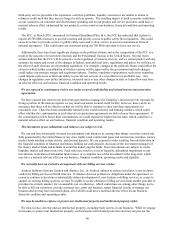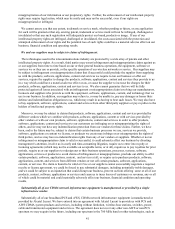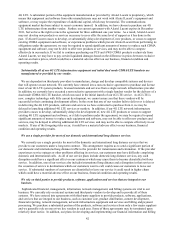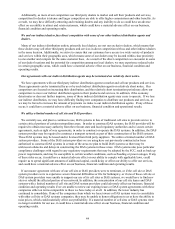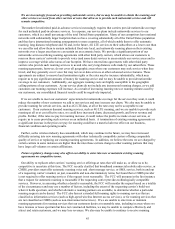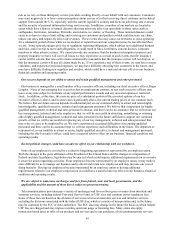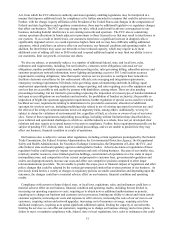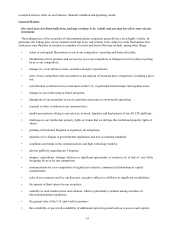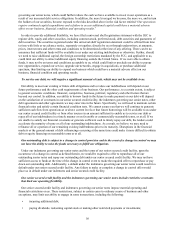Metro PCS 2010 Annual Report Download - page 60
Download and view the complete annual report
Please find page 60 of the 2010 Metro PCS annual report below. You can navigate through the pages in the report by either clicking on the pages listed below, or by using the keyword search tool below to find specific information within the annual report. 50
requirements and there is no guarantee that the FCC will find our construction, or the construction of prior licensees,
sufficient to meet the applicable construction requirement. If the FCC finds that our construction, or the
construction of prior licensees, is insufficient, the FCC could, among other things, find that we are not a qualified
licensee and revoke any or all of our licenses and impose other penalties and sanctions. In addition, a failure to
comply with applicable license conditions or regulatory requirements could result in revocation or termination of our
licenses, in the loss of rights to serve unbuilt areas and/or fines and forfeitures. We have had inquiries from
regulatory agencies regarding our compliance with regulatory requirements and we may in the future receive
additional inquiries. We have responded, are in the process of responding, or will respond to such inquiries. We
cannot give any assurance that the FCC will agree with our compliance efforts or that the FCC will not impose fines,
fees, or forfeitures, seek a consent decree, or take other adverse action against us.
We must renew our FCC licenses periodically. Renewal applications are subject to FCC review and public
comment to ensure that licensees meet their licensing requirements and comply with other applicable FCC
requirements, rules and regulations. For all PCS, AWS and 700 MHz licenses, the FCC also requires that a licensee
provide substantial service in order to receive a renewal expectancy. There is no guarantee that the FCC will find
our completed system construction sufficient to meet the build out or renewal requirement. Additionally, while
incumbent licensees enjoy a certain renewal expectancy if they provide substantial service, the substantial service
standard is not well articulated and there is no guarantee that the FCC will conclude that we are providing
substantial service, that we are entitled to a renewal expectancy, or will renew all or any of our licenses, without the
imposition of adverse conditions. The FCC recently released a Notice of Proposed Rulemaking seeking to create
consistent requirements for renewal of licenses, consistent consequences for discontinuance of service, and to clarify
certain construction obligations. The proposed changes to the existing renewal and discontinuance of service
requirements may be applied retroactively to existing licenses that will be renewed in the future. If the changed
requirements are applied retroactively to our existing licenses, the FCC may determine that our, or the construction
undertaken by prior licensees, or the actions taken by us, or the prior licensees, relating to the buildout or
discontinuance of service does not satisfy such changed requirements and determine not to renew our licenses. If we
fail to file for renewal of any particular license at the appropriate time, or fail to meet any regulatory requirements
for renewal, including construction and substantial service requirements, we could be denied a license renewal or be
subject to a competing application. The FCC also may impose additional regulatory requirements or conditions on
our licenses or our business and may impose a substantial renewal fee to allow a licensee to continue to use a
particular spectrum. Such additional regulatory requirements, fees or conditions could increase the cost of doing
business, could cause disruption to existing networks, and could require us to make substantial investments. Any
loss or impairment of any of these licenses, failure to renew, fines and forfeitures, the imposition of conditions, or
other actions by the FCC could have a material adverse effect on our business, financial condition and operating
results.
We may be unable to obtain necessary governmental authorizations and permits on reasonable terms and
conditions.
Our ability to operate our business is dependent on, among other things, our ability to obtain governmental
authorizations and permits in the planning, construction and operation of our networks. Obtaining governmental
authorizations and permits can be very time sensitive and require compliance with administrative and procedural
rules. To remain competitive, we must obtain such authorizations and permits on a timely basis, at a reasonable cost
and on acceptable terms and conditions. If we cannot obtain the necessary governmental authorizations and permits
at all or on reasonable terms and conditions, we may incur substantial costs associated with finding an alternate,
viable resolution, relocating sites and infrastructure, writing off cost and expenses associated with sites we are
unable to use, and we may experience a delay or impairment in the provisioning of our services which could have a
material adverse effect on our business, financial condition and operating results.
We are subject to significant federal and state regulation.
The FCC regulates the licensing, construction, modification, operation, ownership, sale and interconnection of
wireless communications systems, as do some state and local regulatory agencies. We cannot assure you that the
FCC or any state or local agencies having jurisdiction over our business will not impose new or revised regulatory
requirements, new or increased costs, or require changes in our current or planned operations. Indeed, the FCC has
initiated a series of inquiries and rulemaking proceedings pertaining to the wireless industry that could result in
material changes in the applicable rules and policies. The FCC and state regulatory agencies also are increasingly
focused on the quality of service and customer support that wireless carriers provide and the FCC and several
agencies have proposed or enacted new and potentially burdensome regulations in this area. The Communications


